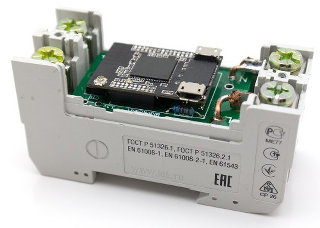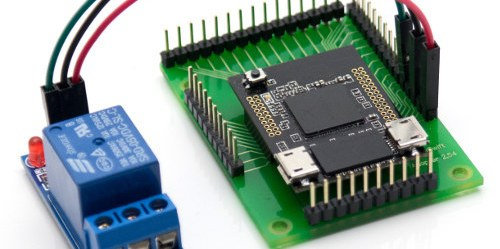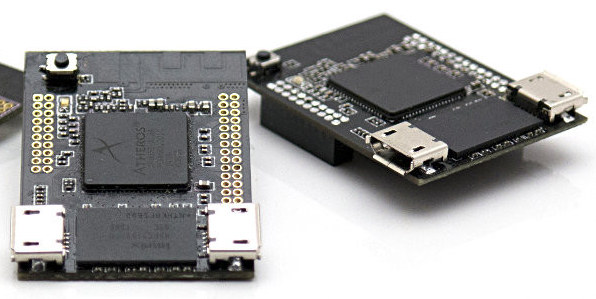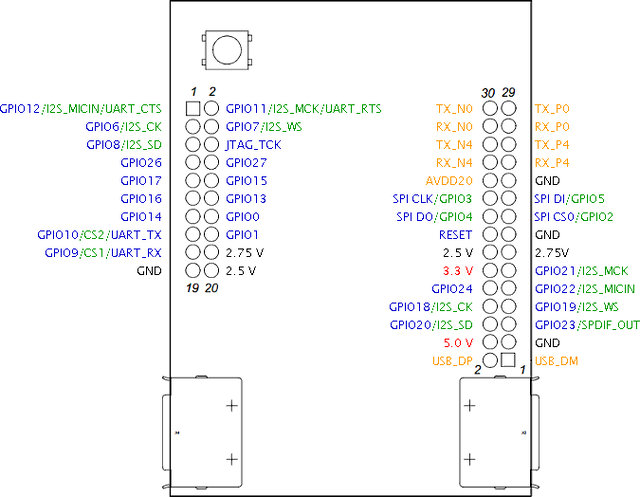In case you thought there were not enough Wi-Fi board in the market already, here’s another one with Black Swift. The board runs OpenWRT, is a little larger than Vocore, and quite smaller than WRTnode, is powered by Atheros AR9331, provides access to I/Os via headers, and comes with two micro USB ports which should make it easy to use, and allow some interesting applications with USB devices.
- SoC – Qualcomm Atheros AR9331 32-bit MIPS 24K CPU core @ 400 MHz, or 200 MHz in energy-saving mode selectable by software
- System Memory – 64 MB DDR2 SDRAM
- Storage – 16 MB NOR flash
- Connectivity – 802.11 b/g/n Wi-Fi (1×1, up to 150 Mbps) with PCB antenna
- USB – 1 x microUSB for power, 1x microUSB 2.0 port
- Expansion – Headers for 26x GPIO, 2x Fast Ethernet, SPI, I²C, 1x 16550 UART, 1x USB 2.0
- Misc – Factory reset button
- Power Supply
- 5 V (with full USB support), 3.3 V (w/o USB power), 3.4…6 V (using onboard voltage regulator, w/o USB power)
- Integrated voltage regulators: 3.3 V (switching mode, 1 A max, at least 700 mA available for powering external devices), 2.75 V (linear LDO, 300 mA max)
- Power consumption: 120 mA typical (400 MHz CPU frequency, Wi-Fi enabled), 60 mA in energy-saving mode (200 MHz, Wi-Fi disabled), 300 mA max
- I/O Voltage / Current – 3.3 V max (5V non-tolerant), maximum load 24 mA
- Dimensions – 25x35x4 mm
- Weight – 3 g
The board runs OpenWRT 14.07 Barrier Breaker, and will allegedly be open source hardware with schematics, Gerber files, and BoM released once development is complete. The company will also release OpenWRT patchsets, and utilities they developed for the board.
 They also have developers three projects to showcase their board capabilities:
They also have developers three projects to showcase their board capabilities:
- A network music player with a Sound Blaster audio card connected to the USB port via a USB OTG adapter, which can be controlled with MPDroid on Android, QMPDClient on PC, or other MPD compliant clients.
- A Christmas tree lights controller. A little out of season, but it shows the GPIO capabilities of the board with several Betlux’s BL-FL7600 ultrabright LEDs, and a L293 quadruple H-bridge driver.
- An electricity meter (pictured on the right) to show a more professional use of the board. Power measurement is done via Analog Devices ADE7757 chip with frequency output.
You can have a look at these demos, right after the product introduction in the video below.
The project is on Kickstarter trying to raise $33,000 NZD (about $24,700 US) to fund mass production. There are three version of the board / kits available:
- Black Swift Basic – $35 NZD pledge (~$26 US)
- Black Swift PRO with on-board USB-UART adapter, and an extra baseboard (1.27mm to 2.54 mm header adapter) – $42 NZD pledge (~$34 US)

Perks all include shipping worldwide, and delivery is scheduled for June 2015. You can also visit Black Swift website and its Wiki for a few more details.

Jean-Luc started CNX Software in 2010 as a part-time endeavor, before quitting his job as a software engineering manager, and starting to write daily news, and reviews full time later in 2011.
Support CNX Software! Donate via cryptocurrencies, become a Patron on Patreon, or purchase goods on Amazon or Aliexpress. We also use affiliate links in articles to earn commissions if you make a purchase after clicking on those links.







nice thing…
i’d really think about using that for low-performance needs (what rpi currently does for me) because of wireless
it’s not like i’d use wireless for everything, but those small devices are exactly where i like least to attach a single cable to each.
Or just visit aliexpress and type in search box “ar9331” you will find a lot of ar9331 modules without waiting for Kickstart project. 🙂
Yes, it is always funny to see people spending their money to support the redevelopment of yet available products…
That is great that Black Swift came to Kickstarter. Guys that made the board are great developers. They are published series of articles on russian IT site habrahabr.ru.
http://habrahabr.ru/company/blackswift/blog/247817/
http://habrahabr.ru/company/blackswift/blog/247925/
http://habrahabr.ru/company/blackswift/blog/248037/
These articles describes how to make Cristmas Tree Lights in details from the begining till writing remote control app for Android.
I mean these guys already provided a lot of info, and I believe later we can see much more that just firmware updating. I think they can became little russian Olimex.
Or just type “openwrt” on aliexpress for even more results, nice things, like this one:
http://www.aliexpress.com/item/Qualcomm-Atheros-AR9331-WiFi-Router-Development-board-Linux-OpenWRT-AP121-Firmware-ROM/32234127061.html
Yes Claus I also always amazed at this.
Especially since nowadays information is so widely,and readily available.
@Joe Bucks
You’re kinda mistaken. All those boards are different in many ways:
1. They’re big. Black Swift is smaller than an Arduino Pro Mini while being features full.
2. They (mostly) don’t have a power converter that allows you to use Li-Ion batteries or whatever else to power the board.
3. They often don’t have a decent built-in antenna.
4. They often don’t have that that much (26) I/O ports with standard (1.27mm) step pinholes.
5. They never offer you tutorials, examples, SDK, sources etc.
6. They never provide you with DDR2 RAM.
7. They NEVER, NEVER offer all this at once! =)
If you’re really curious of the complete list of what made those guys to start developing Black Swift, arm yourself with Google Translate and check their post on that topic at Habrahabr: http://habrahabr.ru/company/blackswift/blog/246673/